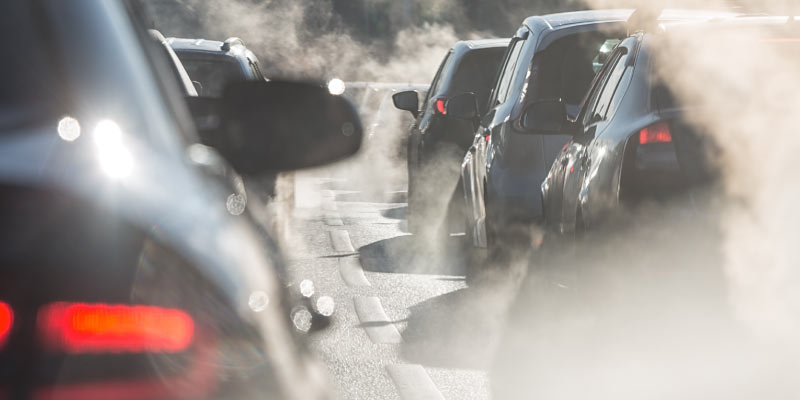
“Diesel dupe.” “Dieselgate.” “Emissionsgate.” Headlines were ripe with nicknames when the news broke in September 2015 that Volkswagen Group had violated the Clean Air Act by installing software in their diesel engines that tampered with emissions-testing results.
After settling with owners of the affected vehicles — nearly 600,000 — the remaining settlement funds were distributed to organizations and institutions across the country that are working on environmental mitigation projects. The State of Illinois is directing funds to invest in transportation electrification. In Mississippi, the Jackson School District is purchasing six electric school buses and charging stations with their payout. And at the University of Wisconsin–Madison, researchers in the Nelson Institute for Environmental Studies’ Center for Sustainability and the Global Environment are boosting clean-air research efforts. Settlement funds were awarded to two labs led by Nelson Institute faculty: the Gibbs Land Use and Environment Lab and the Holloway Group.
In the Gibbs Land Use and Environment (GLUE) Lab, director Holly Gibbs focused her portion of the funding on research and outreach surrounding tropical deforestation and its atmospheric impacts. Gibbs, who is also a professor of environmental studies in the Nelson Institute, is known across the globe for her work in this space, particularly on the intersection of agriculture and deforestation in Latin America.
In October 2022, Gibbs and her colleagues published a shocking study that showed just how devastating Brazil’s beef industry is on the environment: despite Brazilian meatpackers best efforts, the study found that millions of cattle had been grazing on protected or illegally deforested lands in Brazil. In addition to the beef industry, GLUE is also studying oil palm expansion in Peru. Funding from the Volkswagen settlement has helped bolster research efforts in both of these areas. “These are the world’s largest drivers of deforestation and the primary source of greenhouse gas emission to the atmosphere in [those] countries,” Gibbs said.
The funds have helped GLUE contribute to timely policy discussions, such as a May 2023 European Union (EU) regulation that established “mandatory due diligence rules” for all operators, traders, and exporters of goods including cattle and palm oil. “This is a huge step forward for the world’s rainforests,” said Gibbs. “[With] the current monitoring approach … nearly 85 percent of deforestation goes without any assessment. This new EU deforestation regulation is a gamechanger since it means that Brazil and companies operating in Brazil will need to implement much broader and more stringent monitoring approaches.” With support of the settlement funds, Gibbs also traveled to Washington, DC, at the invitation of JBS S.A. — the world’s largest meat processing company — where she presented her findings to high-ranking Brazilian officials.
From the ground to the sky, the second recipient of settlement funds, the Holloway Group, is focusing in on environmental justice and air quality by boosting research on monitoring tools. Led by Tracey Holloway — who holds the inaugural Jeff Rudd and Jeanne Bissell Professorship of Energy, Analysis, and Policy with the Nelson Institute and the Department of Atmospheric and Oceanic Sciences — the lab is using their funds to examine modeling and monitoring of sulfur dioxide, a pollutant produced by industries and power plants.
Regular exposure to high concentrations of sulfur dioxide is well known to cause respiratory illnesses in healthy adults, “but even much lower exposures can lead to emergency room visits and hospitalization for people with asthma, with cardiac problems, children, older adults, and other at-risk groups,” Holloway said. Sulfur dioxide also morphs into sulfate aerosol, the leading component of the dangerous PM 2.5 pollutant. “Beyond these impacts on human health, sulfate contributes to acid deposition, which can damage plant tissue, impact aquatic animals and leach aluminum from soil while also affecting climate and cloud formation and brightness,” said Holloway.
These pollutants have been regulated by the Environmental Protection Agency since 1971, and while they are being measured, it’s not as robust as it could, or should, be. A limited number of sulfur dioxide monitors has led to completely unmonitored locations, which disproportionately affects neighborhoods that surround industrial sources as well as historically disadvantaged communities. And while air quality and climate policies are made using the available data, these holes and oversights can lead to unjust policies.
With funds from the Volkswagen settlement, Holloway’s team has increased their research on AERMOD, a modeling tool that is widely used for linking data, health impacts, and policy. Their work currently includes comparing AERMOD readings with ground-based measurements, publishing a paper that highlights its strengths and weaknesses, and developing new, advanced methods to evaluate it. “Our work advances the science behind AERMOD, with the goal of developing best-practice guidelines for model inputs and considering the application of the model to environmental justice and public health,” Holloway said.
Both Gibbs and Holloway are committed to maximizing the impact that these funds can have, not only to advance UW–Madison research, but to move toward a cleaner future. Recipients for settlement funds were identified and contacted by the case’s attorneys — not through an application process. Nelson Institute Dean Paul Robbins is honored that the was selected as a beneficiary based on its reputation for world-class research. “When the attorneys called during the depth of the pandemic, presenting the opportunity to put the settlement money to work,” Dean Paul Robbins explains, “I was reminded how prominent our science is, how high-profile UW faculty and the institute are. This is a pretty big deal. I’d like to get more phone calls like that one,” Robbins said with a smile.